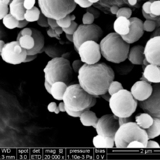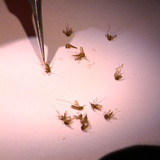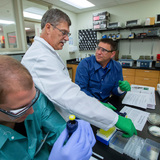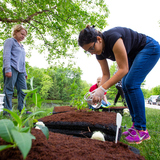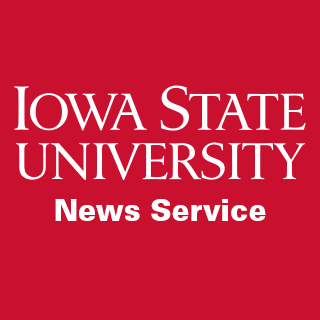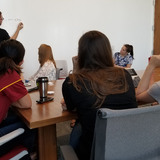News Archive
Thursday, July 5 2018
-
Medical researchers, engineers look to nanovaccines to fight pancreatic cancer
A research team led by Iowa State's Balaji Narasimhan and affiliated with the Nanovcaccine Institute based at Iowa State is studying nanovaccines for treating pancreatic cancer. There are no screening tests or early warning signs for the disease and so the cancer has often spread when it is found. When that's the case, current treatments are rarely effective. The researchers say nanovaccines could generate a response in pancreatic cancer. Their study is supported by a $2.67 million grant from the National Cancer Institute of the National Institutes of Health.
-
ISU Medical Entomology Laboratory monitoring brisk start to mosquito season
The Medical Entomology Laboratory at Iowa State University has tracked mosquito populations in the state since 1968. Lab personnel employ a range of traps to collect and catalog as many as 200,000 mosquitoes every year. This summer’s mosquito season began with a bang but has since calmed down.
-
Decision to live together negatively affects wealth accumulation
Living together is often a first step before marriage, or for a growing number of millennials, an alternative to tying the knot. Money or debt can be a common reason for this decision, but there are long-term financial implications to cohabitation, according to research from Iowa State and Kansas State universities.
-
Biotechnology outreach brings science home
K-14 educators are on campus to train in the scientific principles and techniques needed to boost biotech in their classrooms. They're the latest participants in annual workshops coordinated by Iowa State's Biotechnology Outreach Education Center. More than 3,200 Iowa teachers have received the training, and 320,000 students have benefited from the program's free lab supplies, instructional materials and equipment loans.
-
Crisis can force re-evaluation and derail efforts to reach goals
Setbacks are to be expected when pursuing a goal, whether you are trying to lose weight or save money. The challenge is getting back on track and not giving up after a difficulty or crisis, says an Iowa State marketing professor working on practical ways to help people stick to health-related goals.
-
Accountability sessions give ISU student startups time to set benchmarks, course-correct
A key component of CYstarters is its weekly accountability sessions, giving the student participants an opportunity to discuss what they’ve worked on the past week, their plans for the upcoming week and their “pains and gains.” The startups receive valuable input from CYstarters staff, mentors and their peers.
-
Floating islands project expands on water quality research to study pollinator plants
The sustainable environments interdisciplinary graduate program’s floating islands research project has returned to Iowa State University’s Lake LaVerne for the first summer since 2015. While the project still measures nutrient uptake from the water, this year’s research adds pollinator plants to determine if floating islands could also help threatened insects such as bees and butterflies.
-
WHO ‘gaming disorder’ classification opens door for treatment
The World Health Organization’s classification of video game addiction as a mental health disorder is a significant step toward getting people the help they need, said Douglas Gentile, an Iowa State University professor of psychology and expert on video games and addiction.
-
Iowa State University to host federally funded center of excellence for swine genomics
A new federally funded center of excellence led by Iowa State University scientists will analyze various structures and mechanisms in the swine genome with the goal of allowing pork producers to predict with greater accuracy the traits in their herds. The institute will include personnel at Iowa State, Michigan State, the University of California at Davis, and the USDA Agriculture Research Service.
-
Professionals share expertise to help CYstarters move from concept to launch
To help startups move from concept to launch, CYstarters provides educational workshops on topics ranging from focus groups to patent law to digital marketing. Entrepreneurs learn the ins and outs of starting a business and have access to resources that might otherwise be out of reach.
-
Scientists find ‘patterns in the noise’ that could help make more accurate crop performance predictions
Scientists have identified patterns in how and when sorghum plants flower that could help plant breeders and growers predict other important traits in a wide range of environments and geographic regions. The research team created an index based on photothermal time, a crucial phase in a plant’s development when it processes the environmental cues of sunlight and temperature. The research looked at sorghum, but the scientists believe the same method could be applied to a range of plants, including other crops.
-
Eisman receives NEH fellowship for research on East German contemporary artist
Art historian April Eisman, an Iowa State University associate professor of art and visual culture, has received a National Endowment for the Humanities Fellowship to spend the 2018-2019 academic year doing research in Germany on artist Angela Hampel, one of former East Germany's most successful and outspoken artists.
-
ISU student project wins at national Hospitality Design Awards competition
A team of recent Iowa State University College of Design graduates won the student category at the 14th HD Awards competition, a national competition sponsored by Hospitality Design magazine that recognizes outstanding design projects in 23 categories related to the hospitality industry. The winning project was “Arrowhead Resort” by Taylor Bryan and Holland Shodeen, both 2017 ISU graduates in interior design.
-
Tax hurts investment in medical device research and development
New Iowa State University research shows companies cut funding for research and development in response to a tax imposed on medical devices as part of the Affordable Care Act. The study found the tax reduced R&D investment by $34 million and also negatively affected sales revenue, gross margins and earnings.
